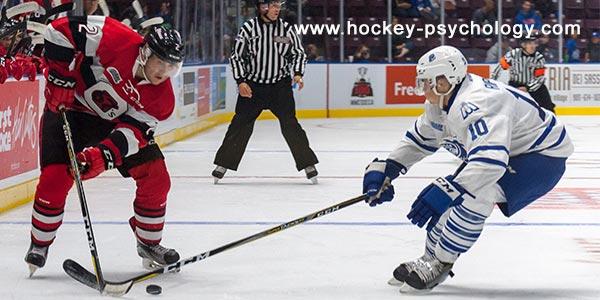
How to Stay Confident After Mistakes
We recently received a question on our hockey survey from a teen-aged hockey player. He asked:
“How do I get my confidence back and stop hesitating with the puck and second-guessing myself?”
This player went on to say… “I play defense on my high school hockey team.
In one mid-season tournament, I made a couple of bad ill-advised passes that led to some scoring opportunities for the other team. My coach really let me have it after the first period.”
“The next period, I kept repeating to myself what to not do when I was on the ice. I was so afraid to make another bad pass that I held on to the puck too long and had the puck taken away which led to a goal for the other team.”
This is a common challenge for many hockey players…
As a hockey player, indecisiveness leads you to making more mistakes. When you’re afraid to make mistakes during your shift on the ice, you’ll perform hesitantly and not take risks. Your fear paralyzes you on the ice.
When you don’t commit to a pass, hesitate when taking a shot, or fail to go for a loose puck, you are playing scared. In hockey, you have to make quick decisions. Coaches then assess your performance as if you are not focused on the ice.
What Causes Hesitant Play?
Your fear of making a mistake or playing cautiously can lead to making mistakes. When you are afraid of making mistakes, you will try to coach yourself through each play and second-guess your decisions when you have the puck. This indecision results in lack of trust in your skills and making more
mistakes.
Telling yourself what to do during a shift is no different than a coach barking out instructions or giving you negative feedback during the middle of a game.
Those instructions split your focus, lead to tentative play and result in
mistakes.
It’s no different than your coach yelling at you the entire shift, shouting out directions and yelling what mistakes to avoid. You would have one ear focused on what the coach is saying, while simultaneously trying to focus on what you are doing during the shift.
For instance, Christian Koelling, the Coach-In-Chief for the Minnesota district of USA Hockey, commented on the problem with information overload.
KOELLING: “You see a lot of coaches shouting instructions from the bench during the game. The odd thing is you don’t see any NHL coaches doing that. Even NHL players make mistakes but coaches don’t yell the entire game and try to tell them what to do every second.”
As you can see, too much self-coaching or too much self-criticism can be a distraction and lead to hesitant play. This undermines your confidence to help your team.
The Key to Playing Freely During Hockey Games
Since hockey is a fast game, there is no time to debate what you should do on the ice. The key to playing at your peak is to make quick decisions in real time.
Quick decisions require that you play intuitively, in the moment, and trust your game. You have to trust your hockey instincts during a game and not second-guess what you are doing.
How do you make quick decisions? You go with the first play that comes to mind. If you have a shot, take it. Don’t question if a teammate has a better shot. If you have a chance to win the puck in the corner, go for it. Avoid questioning if you can get to the puck in time.
Trust in your hockey instincts and years of practice and play and then your confidence will return!
Related Articles on Hockey Mental Game:
- Do You Have the Look of a Confident Hockey Player?
- How to Not Panic During Hockey Games
- How to Create a Winning Mindset for Hockey
*Subscribe to The Sports Psychology Podcast on iTunes
*Subscribe to The Sports Psychology Podcast on Spotify
Mental Coaching Programs for Hockey
Our mental game coaching programs for hockey players helps athletes improve confidence, concentration, let go of errors quickly, and stay composed during crunch-time. Read more about sports psychology for hockey players at Peaksports.com
Please contact me by phone at 888-742-7225 or by filling out the webform below to learn more about our personal mental training programs for hockey players or teams:
Leave a Reply